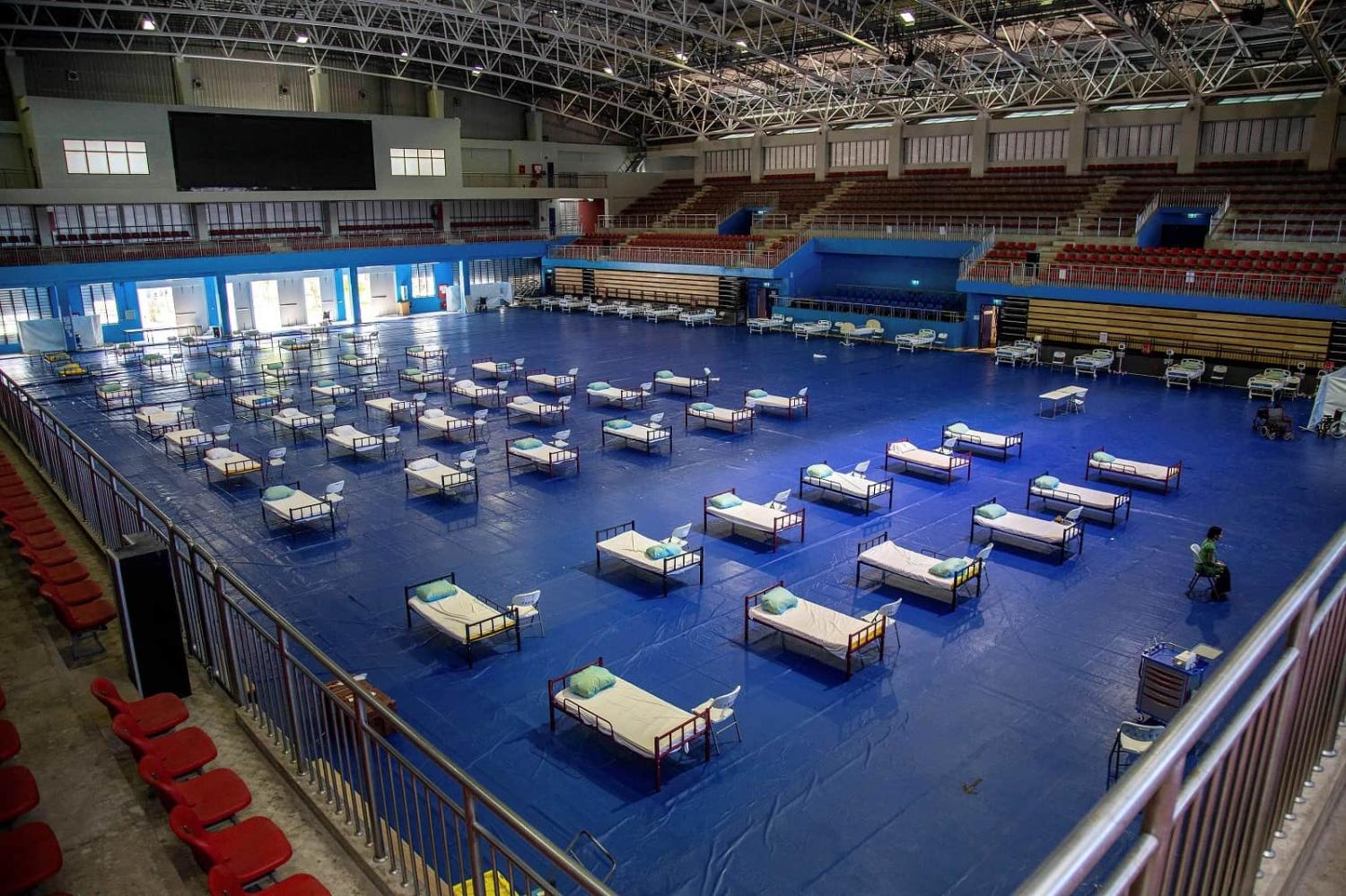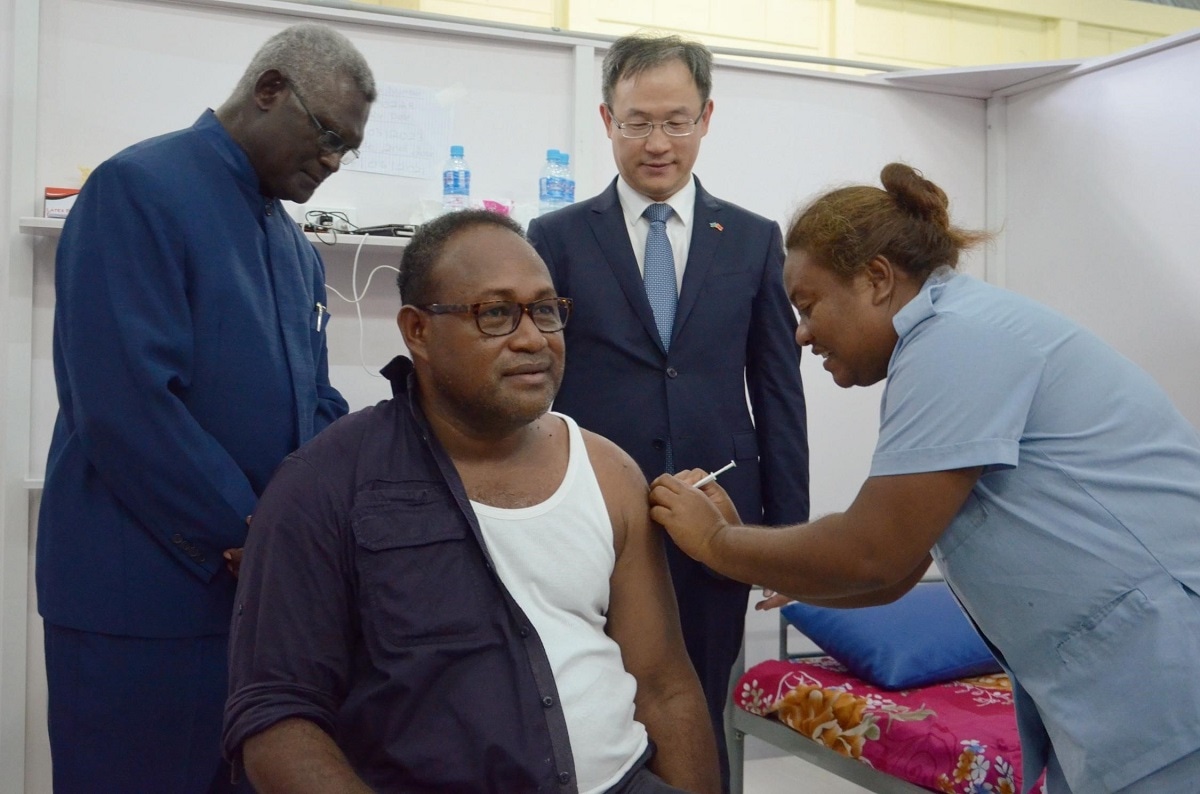Pooling the expertise and resources of development partners is a win not only for regional healthcare but soft diplomacy.

A makeshift Covid-19 hospital in Suva, Fiji, on 31 July 2021
(Leon Lord/AFP via Getty Images)
Pacific Islands
Solomon Islands
As US and China competition increases in the region, perhaps it is time for Pacific Island countries to call for “medical détente” to invoke a kind of cold war Geneva Convention medical neutrality. The health needs across the Pacific are significant – a competitive scramble by major powers to out-do one another will not fix the problems.
The goal of medical détente should be to bring representatives from China, Australia, the United States and Japan to the table devoid of political influence and focus.
Medical détente would call for all development partners operating in Pacific Island countries to coordinate medical capacity-building programs in order to focus on improving care. Historically, there have been cases where physicians and health specialists from multiple countries have worked together despite political differences. Examples of this include the 1980 International Physicians for the Prevention of Nuclear War movement, the West Africa Ebola outbreak and the Medical Action Group of the Philippines.
The goal of medical détente should be to bring representatives from China, Australia, the United States and Japan to the table devoid of political influence and focus on an area of the healthcare system that the host nation identifies as in need of strengthening. This multinational team would have cross- table discussions in order to make sure areas being addressed are in alignment with needs and are not redundant. At the centre of this type of approach must be the desires and needs of the people and the government of the host nation.
Many Pacific Island countries have significant health system challenges such as workforce shortages, limited specialised training options, vulnerable infrastructure and poor digital connectivity.
Solomon Islands
As US and China competition increases in the region, perhaps it is time for Pacific Island countries to call for “medical détente” to invoke a kind of cold war Geneva Convention medical neutrality. The health needs across the Pacific are significant – a competitive scramble by major powers to out-do one another will not fix the problems.
The goal of medical détente should be to bring representatives from China, Australia, the United States and Japan to the table devoid of political influence and focus.
Medical détente would call for all development partners operating in Pacific Island countries to coordinate medical capacity-building programs in order to focus on improving care. Historically, there have been cases where physicians and health specialists from multiple countries have worked together despite political differences. Examples of this include the 1980 International Physicians for the Prevention of Nuclear War movement, the West Africa Ebola outbreak and the Medical Action Group of the Philippines.
The goal of medical détente should be to bring representatives from China, Australia, the United States and Japan to the table devoid of political influence and focus on an area of the healthcare system that the host nation identifies as in need of strengthening. This multinational team would have cross- table discussions in order to make sure areas being addressed are in alignment with needs and are not redundant. At the centre of this type of approach must be the desires and needs of the people and the government of the host nation.
Many Pacific Island countries have significant health system challenges such as workforce shortages, limited specialised training options, vulnerable infrastructure and poor digital connectivity.

Solomon Islands Deputy Prime Minister Manasseh Maelanga receives his first jab during the launch ceremony for Chinese-provided Covid-19 vaccines at the Central Field Hospital in Honiara on 21 May 2021 (Xinhua via Getty Images)
Solomon Islands, a country I know well and often cast at the centre of this rising tension between the United States and China, is no exception. The country’s healthcare system is underfunded and centralised in Honiara, the capital city. The nation of just over 700,000 people is spread out over 28,000 square kilometres, with 80 per cent of people living in the outer islands.
Since switching allegiance from Taiwan to China in 2019 and signing a 2022 security agreement with China, Solomon Islands has been caught up in a tug-of-war match between regional players. This competition has been playing out in the media and is fracturing the population of the “hapi isles” in a way that could push them towards unrest. The consequences of this could be devastating. Solomon Islands needs medical détente.
As each partner’s neutral health specialists work together, misunderstandings can be addressed face-to-face right along with issues of interoperability.
The recently built Intensive Care Unit at Solomon Islands’ National Referral Hospital is one example of how a multinational healthcare development partnership could be beneficial. The doctors and nurses, as well as the people of Solomon Islands, will benefit greatly from a comprehensive critical care program. Aspects of establishing the program could be parsed out: teaching by China, medical supply support by Australia, medication support by the United States, and diagnostic equipment support by Japan. This type of approach would be similar to how the United States and China assisted Liberia and Sierra Leone in combating the 2014 Ebola outbreak.
Any collaboration like this requires regular dialogue and working together as input from each partner must be coordinated into a concise, seamless capacity-building portfolio. Solomon Islands doctors and nurses as well as the Ministry of Health must be at the centre of the partnership. Silos of care must be avoided as they will promote “medical warfare” through non-beneficial competition. The co-mingling of funds is not necessary for this type of approach as each country addresses a specific portion of the health system.
A coordinated medical détente program will have co-benefits. It will require Chinese, Australian, American and Japanese health teams to communicate and find common ground while implementing a program that benefits the very countries they are sparring over. As each partner’s neutral health specialists work together, misunderstandings can be addressed face-to-face right along with issues of interoperability. This way, respect is built as the program delivers.
This type of dialogue has already begun in Solomon Islands. Recently, the CEO of the National Referral Hospital hosted a tea where doctors and nurses from Solomon Islands, Australia and China came together to talk. It was well received on all sides. Our group will do the same when we are in Honiara in August.
It is entirely possible that common ground can emerge between China, the United States, Australia and Japan from collectively addressing healthcare in Pacific Island countries. Working together towards better health in the Pacific Islands might just be an opening to see America and China getting along.
Solomon Islands, a country I know well and often cast at the centre of this rising tension between the United States and China, is no exception. The country’s healthcare system is underfunded and centralised in Honiara, the capital city. The nation of just over 700,000 people is spread out over 28,000 square kilometres, with 80 per cent of people living in the outer islands.
Since switching allegiance from Taiwan to China in 2019 and signing a 2022 security agreement with China, Solomon Islands has been caught up in a tug-of-war match between regional players. This competition has been playing out in the media and is fracturing the population of the “hapi isles” in a way that could push them towards unrest. The consequences of this could be devastating. Solomon Islands needs medical détente.
As each partner’s neutral health specialists work together, misunderstandings can be addressed face-to-face right along with issues of interoperability.
The recently built Intensive Care Unit at Solomon Islands’ National Referral Hospital is one example of how a multinational healthcare development partnership could be beneficial. The doctors and nurses, as well as the people of Solomon Islands, will benefit greatly from a comprehensive critical care program. Aspects of establishing the program could be parsed out: teaching by China, medical supply support by Australia, medication support by the United States, and diagnostic equipment support by Japan. This type of approach would be similar to how the United States and China assisted Liberia and Sierra Leone in combating the 2014 Ebola outbreak.
Any collaboration like this requires regular dialogue and working together as input from each partner must be coordinated into a concise, seamless capacity-building portfolio. Solomon Islands doctors and nurses as well as the Ministry of Health must be at the centre of the partnership. Silos of care must be avoided as they will promote “medical warfare” through non-beneficial competition. The co-mingling of funds is not necessary for this type of approach as each country addresses a specific portion of the health system.
A coordinated medical détente program will have co-benefits. It will require Chinese, Australian, American and Japanese health teams to communicate and find common ground while implementing a program that benefits the very countries they are sparring over. As each partner’s neutral health specialists work together, misunderstandings can be addressed face-to-face right along with issues of interoperability. This way, respect is built as the program delivers.
This type of dialogue has already begun in Solomon Islands. Recently, the CEO of the National Referral Hospital hosted a tea where doctors and nurses from Solomon Islands, Australia and China came together to talk. It was well received on all sides. Our group will do the same when we are in Honiara in August.
It is entirely possible that common ground can emerge between China, the United States, Australia and Japan from collectively addressing healthcare in Pacific Island countries. Working together towards better health in the Pacific Islands might just be an opening to see America and China getting along.
No comments:
Post a Comment